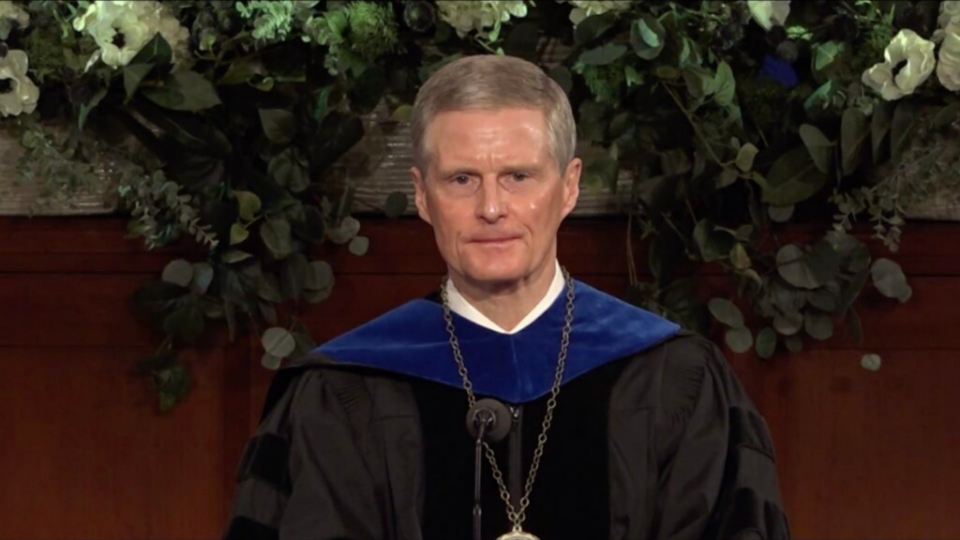
Bednar-BYU-i
Elder David A. Bednar of the Quorum of the Twelve Apostles speaks to BYU–Idaho graduates during online commencement exercises on December 16, 2020. Photo is a screenshot of the broadcast on byui.edu. 2020 by Intellectual Reserve, Inc. All rights reserved.This story appears here courtesy of TheChurchNews.com. It is not for use by other media.
By Rachel Sterzer Gibson, Church News
In a year where the COVID-19 pandemic has disrupted students’ experiences on campus, Elder David A. Bednar of the Quorum of the Twelve Apostles explained to Brigham Young University–Idaho graduates that they will be better because of the constraints, limitations and deprivations they have experienced.
Speaking during the BYU–Idaho fall commencement exercises on Wednesday, December 16, the Apostle spoke to his virtual audience, which included 2,747 graduates, about the blessings they have received and the blessings that will come to future students because of their response to the challenges of this year.
Elder Bednar began his remarks by describing the Latter-day Saints’ epic 1846 evacuation of Nauvoo, Illinois, which he compared to a three-act play.
In Act One, the winter exodus, President Brigham Young led approximately 3,000 Latter-day Saints across Iowa in the well-known Camp of Israel trek. Act Two, the spring exodus, included more than 10,000 Saints abandoning Nauvoo in three large waves of refugees. Act Three, the fall exodus, involved about 700 Saints forced from the city at gunpoint.
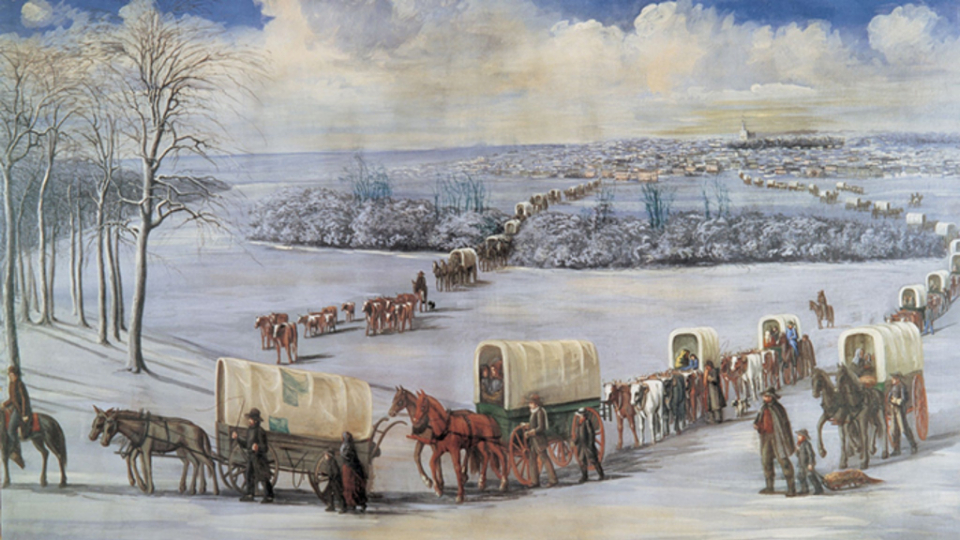
Bednar-BYU-I
During fall commencement exercises on December 16, 2020, Elder David A. Bednar shares a painting titled “The Saints Crossing the Mississippi,” by Grant Romney Clawson. 2020 by Intellectual Reserve, Inc. All rights reserved.Elder Bednar then highlighted several ways that Act One, the winter exodus, is applicable to graduates.
“The Camp of Israel trek was as heroic as it was historic, punctuated by sacrifice, sorrows, deaths, harsh travel conditions, devout prayers and hymns, good humor and optimism,” he said.
Eventually, the migration would be known for its preparedness, orderliness, discipline and effective organization. But accounts of that first February and March “paint a picture of confusion, disorder and severe hardship,” Elder Bednar said.
As the Saints trudged across southern Iowa, the weather was wet and cold, which made the trail muddy and difficult. At Garden Grove and Mount Pisgah, Iowa, the Saints established farms of wheat and other grains to assist the migration. As thousands of refugees slogged across windswept Iowa prairies, they helped prepare the way for those yet to come — erecting cabins and bridges and planting crops.
“Those faithful pioneers erected cabins in which they did not sleep, built bridges they may have used only one time, and planted crops they did not harvest and eat,” Elder Bednar said. “All of their work was intended to bless those who would yet travel the difficult trail to the west. Their deprivation was a source of abundance for many other devoted Latter-day Saints.”
Like those early Saints, “all of us are blessed to drink from wells that we did not dig. And we are warmed by fires that we did not start,” he said.
In many ways, the current pandemic has disrupted students’ experiences at BYU–Idaho, Elder Bednar acknowledged. “Some of the things you hoped to do, you were unable to do. Some of the things you have done were accomplished in ways you did not anticipate. Many things that seemed so certain became quite uncertain.”
The Apostle invited graduates to consider how the challenges they have faced will improve the experience for students at BYU–Idaho in the future. “Truly you are pioneers in the era of COVID-19,” Elder Bednar said, “just as those early pioneers blazed the trail to the Great Salt Lake Valley almost 175 years ago. You are helping to dig wells from which you will not drink. And you are lighting fires from which you will not draw warmth.”
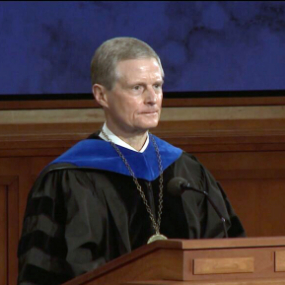
Bednar,-BYU-I
Elder David A. Bednar of the Quorum of the Twelve Apostles speaks to BYU–Idaho graduates during online commencement exercises on December 16, 2020. Photo is a screenshot from the broadcast at byui.edu. 2020 by Intellectual Reserve, Inc. All rights reserved.Twenty years ago, when Elder Bednar served as president of the university as it transitioned from Ricks College to BYU–Idaho, administrators introduced the first requirements for students to take online classes. “Those initial online learning experiences were quite good, but certainly not as effective as the experiences available today with virtual learning,” Elder Bednar said.
The “pioneering students” of 2000 “erected cabins in which they did not sleep, built bridges they did not cross, and planted crops they did not harvest and eat,” he said.
Graduates of 2020 have been blessed by the work and sacrifices of students of two decades ago, and graduates of 2020 are fulfilling the same purpose for students who will study at BYU–Idaho decades from now, Elder Bednar said.
“The lessons you and we learn because of the constraints and limitations imposed by the COVID-19 virus will live on long after the pandemic has been eradicated. And as hard as it may be for you to imagine today, you will be better, stronger and more capable because of the constraints, the limitations and the deprivations you have experienced,” he stated.
Jacob, the fifth son of Lehi and Sariah, grew up in the middle of the strife and conflict caused by his two older brothers, Laman and Lemuel. However, Elder Bednar explained, Jacob was the recipient of a marvelous blessing. “Nevertheless, Jacob, my firstborn in the wilderness, thou knowest the greatness of God; and he shall consecrate thine afflictions for thy gain” (2 Nephi 2:2).
“How can affliction be consecrated for our benefit? How can something good arise from something that seems to be bad?” asked Elder Bednar, who assured listeners that limitations can become “remarkable blessings.”
For example, the inability to gather for Sunday meetings may emphasize the importance of home-centered, Church-supported gospel learning. The opportunity to partake of the sacrament at home may engender greater reverence for the sacred ordinance.
The temporary closing of temples may help members to remember and appreciate the covenants they have accepted and the ordinances they have received, Elder Bednar said. And missionaries who cannot leave their apartments because of the pandemic are discovering innovative ways of using social media to find and teach individuals interested in learning about the gospel of Jesus Christ.
Many years ago, Elder Bednar asked Elder Robert D. Hales, who was recovering from a serious illness, “What lessons have you learned as you have grown older and been constrained by decreased physical capacity?”
Elder Hales responded, “When you cannot do what you have always done, then you only do what matters most.”
Elder Bednar said he was struck by the simplicity and comprehensiveness of his answer. “The limitations that are the natural consequence of advancing age can in fact become remarkable sources of spiritual learning and insight. Physical restrictions can expand vision. Limited stamina can clarify priorities. Inability to do many things can direct focus to a few things of greatest importance.”
“Limitations and constraints caused by a multitude of different circumstances can become remarkable blessings if we have spiritual eyes to see and discerning ears to hear,” Elder Bednar said.
In conclusion, Elder Bednar invited graduates to “always remember your divine identity as a beloved child of a loving Heavenly Father. Valiantly and joyfully press forward along the covenant path ‘with a steadfastness in Christ, having a perfect brightness of hope, and a love of God and of all men’ (2 Nephi 31:20). And strive to ever more consistently let what God wants for you take priority over what you want for you.”
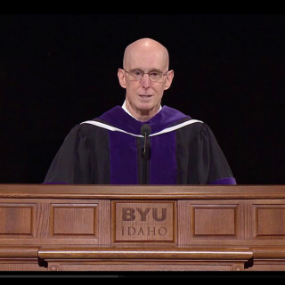
Bednar-BYU-I
BYU–Idaho President Henry J. Eyring awards more than 2,700 degrees during the fall 2020 commencement exercises on December 16, 2020. Photo is a screenshot of the broadcast on byui.edu. 2020 by Intellectual Reserve, Inc. All rights reserved.Those who seek to recognize and understand God’s will and timing, he assured, “will be directed, protected and blessed spiritually and temporally in ways that you today cannot possibly imagine.”
In awarding the 2,747 degrees, including 2,138 bachelor’s degrees and 657 associate’s degrees, BYU–Idaho President Henry J. Eyring noted that 809 of the degrees were online students, with 711 beginning as Pathway Connect students.
In congratulating the graduates, President Eyring promised, “Heavenly Father knows where you are. As you act in faith, the Holy Ghost can guide you and our Savior can open the way.”
Elder Paul V. Johnson, the Church’s Commissioner of Education, also spoke during the online commencement exercises. In his remarks, he said that the last chapter of the Book of Mormon, Moroni 10, is Moroni’s commencement address to those who have been reading his words. The chapter is packed with statements and teachings that help readers become better disciples.
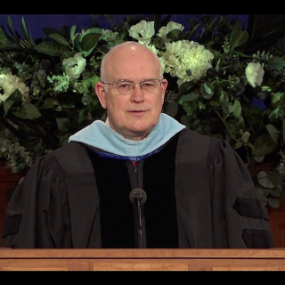
Elder Johnson then invited graduates to continue their quest for discipleship as they move forward in their lives.